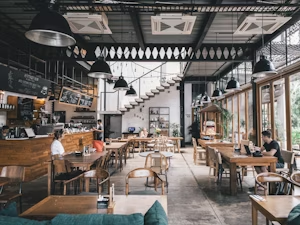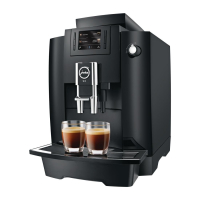Bean To Cup Coffee Machines
Commercial bean to cup coffee machines are the beating heart of UK cafés, restaurants, and hotels serious about serving consistent quality coffee without barista training. These automated marvels grind fresh beans, tamp, brew, and even froth milk—all at the touch of a button. With power options ranging from 2-3kW and programmable settings for different coffee specialties, they're perfect for venues needing reliability during busy periods. After 50 years equipping the nation's hospitality venues, we've seen how these machines pair brilliantly with water filters and cup warmers for a complete professional setup that keeps customers coming back for more!
-
Bean to Cup Coffee Machine | Manual Fill Coffee Maker | Automatic Barista System | Jura WE6 15114
10kgout of stock
295H x 419W x 444D mm
Jura
The variable brewing unit has a capacity of 5-16g and ensures the ideal brewing conditions at all times
Non-metallic Composite
£2,849.98 £4,274.97 -
Bean to Cup Coffee Machine | Automatic Coffee Maker | Manual Fill | Jura JX6 15191
14kgout of stock
470H x 373W x 461D mm
Jura
Can make 2 drinks simultaneously
10 programmable drink specialities at the touch of a button
£4,122.98 £6,184.47 -
Commercial Bean to Cup Coffee Machine | Automatic Coffee Maker | 1-Step Cappuccino | Jura Giga X3 2nd Gen 15229
out of stock
565H x 370W x 497D mm
Jura
150 cup capacity
Non-Metallic Composite
£7,808.98 £11,713.47 -
Bean to Cup Espresso Machine | Professional Coffee Machine | Installation Included | Bravilor Esprecious 12 DC698-WI
39kgout of stock
660H x 540W x 360D mm
Bravilor Bonamat
1x1.4kg Bean Canister & 2x1.3ltr Instant Ingredients
Stainless Steel
£8,131.98 £12,197.97 -
Bean to Cup Coffee Machine | Commercial Coffee Maker | Automatic Espresso | Jura Giga X3c 2nd Gen 15230 FE746
out of stock
565H x 320W x 497D mm
Jura
150 cup capacity
Non-Metallic Composite
£8,416.98 £12,625.47
Commercial Bean to Cup Coffee Machines for Cafés & Restaurants
Brands Trusted by Industry Professionals
Key Features and Benefits
- One-Touch Programming Pre-set multiple drink options—consistent quality every time.
- Integrated Milk System Automatic frothing for perfect cappuccinos and lattes.
- Commercial-Grade Components Built for high-volume service—handles hundreds of drinks daily.
- Rapid Brewing Produces specialty coffees in 25-45 seconds—keeps queues moving.
- Temperature Stability Precision heating elements maintain optimal extraction.
- Adjustable Grinder Fine-tune your grind for peak flavour profiles.
- Self-Cleaning Cycles Automated maintenance—saves staff time.
- Energy-Saving Modes Reduces consumption during quiet periods.
Essential Buying Considerations
Capacity and Volume
- Small cafés: 50-80 cups daily—compact models suffice.
- Busy restaurants: 150-300+ cups—choose high-capacity bean hoppers.
- Consider water tank size vs. plumbed-in models for your space.
Maintenance and Support
- Factor in descaling frequency—water filters reduce maintenance.
- Check warranty periods—2-3 years standard for quality machines.
- Consider service agreements for mission-critical equipment.
How Bean to Cup Coffee Machines Work
The magic of bean to cup machines lies in their all-in-one automation. It starts when whole coffee beans drop from the hopper into the built-in grinder, creating freshly ground coffee to your programmed specifications. The grounds are automatically tamped and water at the optimal temperature (typically 92-96°C) is forced through under pressure (around 9 bar). For milk-based drinks, integrated milk systems steam and froth fresh milk to your desired texture. One touch delivers anything from espressos to cappuccinos—perfect for venues wanting barista-quality without the extensive training!

Trusted Insights from Henry Dalton
![]()
Beverage Equipment Expert
11 years experience
Safety Guidelines
- Check Water Connections Inspect for leaks daily—prevents electrical hazards.
- Secure Placement Position on level, stable surfaces—prevents tipping.
- Mind Steam Wands Prevent burns by training staff on proper handling.
- Use Correct Voltage Ensure appropriate power supply—prevents damage.
- Regular Shutdown Power off nightly—extends component life.
- Proper Earthing Verify electrical safety with annual checks.
Top Tips for Using Bean to Cup Coffee Machines
To maximise your bean to cup investment, use freshly roasted beans within 2-3 weeks of roasting—this dramatically improves flavour. Clean the brewing unit weekly and run the automated cleaning cycle daily. Regular maintenance of the grinder ensures consistent particle size for optimal extraction. Consider water hardness in your area and install appropriate water filters to prevent limescale—this extends machine life and improves coffee taste.
Benefits of Using Bean to Cup Coffee Machines
- Consistent Quality Every coffee tastes perfect—builds customer loyalty.
- Operational Efficiency Reduces staff training—saves management time.
- Reduced Waste Precise dosing minimises bean waste—increases profits.
Did You Know?
- Speed Modern machines can prepare 150-200 drinks per hour—UK-tested.
- Durability Quality commercial units last 7-10 years with proper maintenance.
- Versatility Premium models offer 12+ drink varieties—menu expansion.
- ROI Most machines pay for themselves within 12-18 months in busy venues.




Expert Insights on Bean to Cup Coffee Machines
Having supplied coffee equipment to UK businesses for five decades, we've seen firsthand what makes for a successful setup. 'Bean to cup machines transform venues with limited skilled staff,' explains David, our beverage equipment specialist. 'They deliver consistency that would normally require an experienced barista.'
- Pros: Consistent quality, reduced training needs, operational efficiency.
- Cons: Higher initial investment—though offset by lower staffing costs.
Who Needs Bean to Cup Coffee Machines?
- Cafés Perfect for consistent quality without skilled baristas.
- Hotels Ideal for breakfast service and conference facilities.
- Restaurants Delivers quality coffee without dedicated coffee staff.
- Self-Service Areas Brilliant for offices and business lounges.

Real-World Success with Bean to Cup Coffee Machines
A bustling Bristol café faced a challenge—customers loved their coffee, but inconsistency was becoming an issue as they expanded. After installing a commercial bean to cup machine with an integrated milk system, their problems vanished. 'We've doubled our coffee service without hiring another barista,' the owner revealed. They paired it with a proper water filter and cup warmer, resulting in consistently excellent drinks that kept regulars coming back and bringing friends!

FAQs
- How often should we descale our bean to cup machine? Typically every 3-6 months, depending on water hardness and usage.
- Can bean to cup machines make speciality coffees? Yes, most commercial models produce various drinks including lattes and cappuccinos.
- Are bean to cup machines easy to clean? Most feature automated cleaning cycles—just empty grounds and refill beans.
- What's the average lifespan of a commercial bean to cup machine? With proper maintenance, 7-10 years of reliable service.
- Do they require special water connections? Most professional models can be plumbed in or use internal tanks.
- Which beans work best in bean to cup machines? Medium to dark roasts typically perform best—avoid oily beans.
Looking for Equipment by Business Type?
Not sure where to start? Whether you're running a bustling café, opening a pizzeria, or managing a school canteen, we've made it easy to shop by business type. Explore handpicked equipment bundles and essentials tailored to your industry—saving you time and making sure you get exactly what you need.
Other Categories You Might Find Useful
We’ve selected some closely related categories that might be essential for your setup. Whether you’re expanding your kitchen or just making sure you’ve got everything covered, these links will help you explore more equipment that fits your needs.
What our Customers Say
'Our bean to cup machine delivers barista-quality without the training headache!'
M Mark Riverside Café, York'We serve over 200 perfect coffees daily—couldn't be happier with our investment.'
L Lisa Hotel Belmont, Glasgow
Why Choose EasyEquipment for Bean to Cup Coffee Machines?
- Trusted Supplier 50 years serving UK businesses—genuine expertise.
- Fast Delivery Free nationwide shipping—get brewing quickly.
- Best Price Promise Found it cheaper? We'll match it—hassle-free.
- Expert Support Talk to coffee equipment specialists—not call centres.
Ready to Explore Bean to Cup Coffee Machines?
Browse our carefully selected range of commercial bean to cup coffee machines with confidence. With expert guidance, maintenance tips and trusted brands, you'll find the perfect solution to elevate your coffee service!
#BeanToCupMachine
- #CommercialCoffee
- #CafeEquipment
- #EasyEquipment
- #BaristaMade
- #RestaurantCoffee
- #UKCafe





